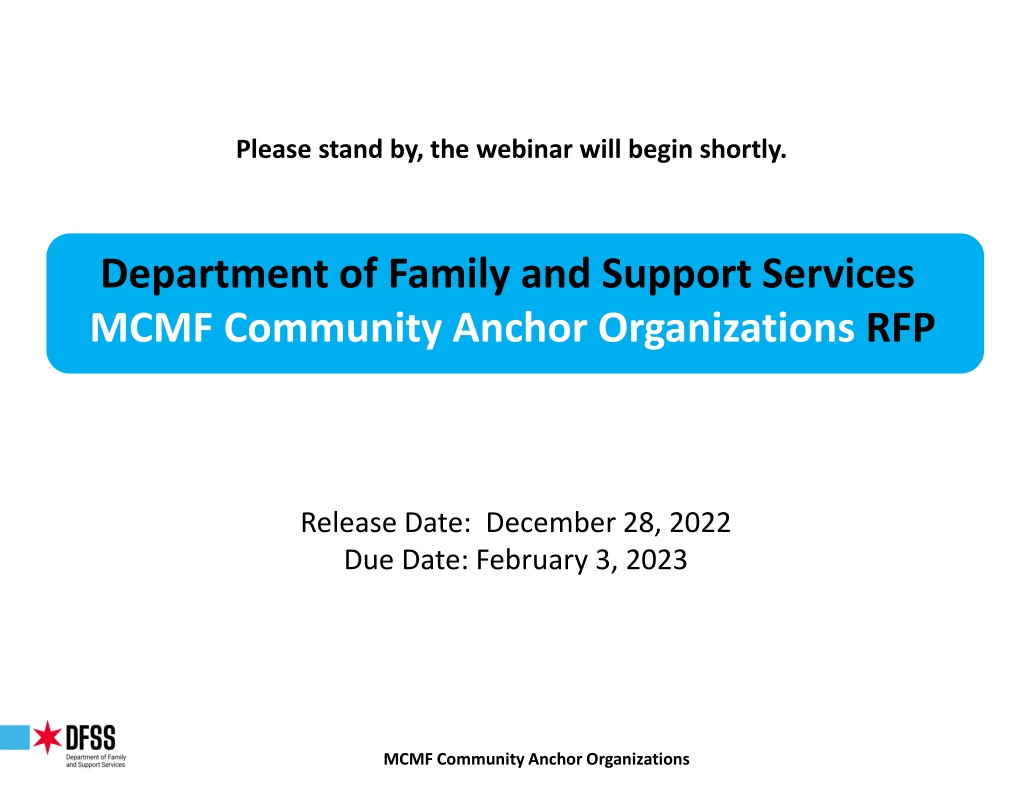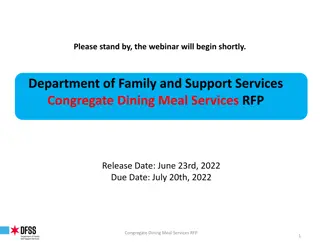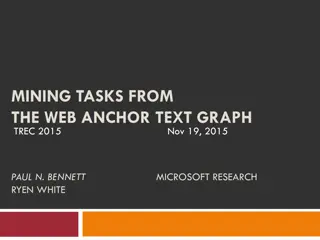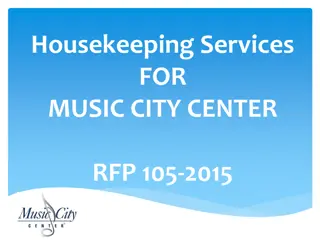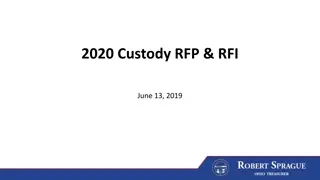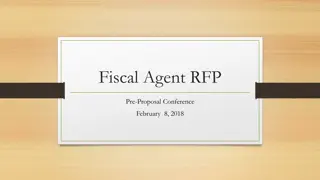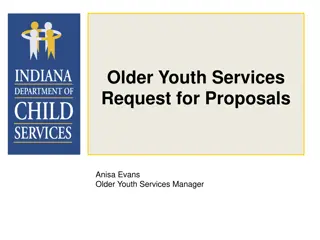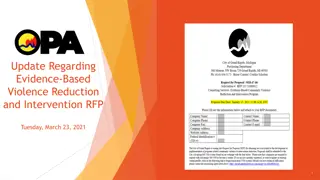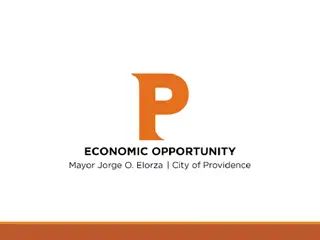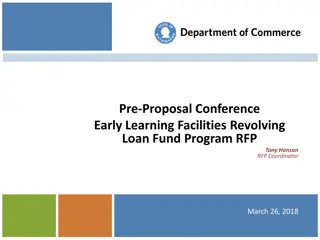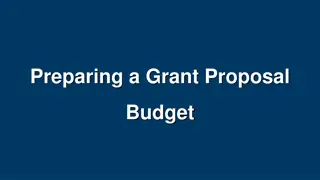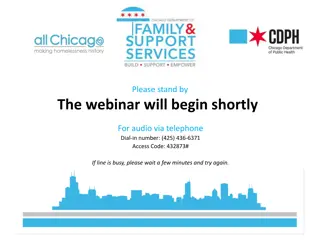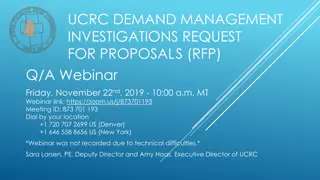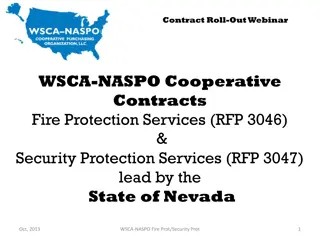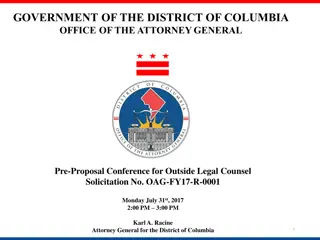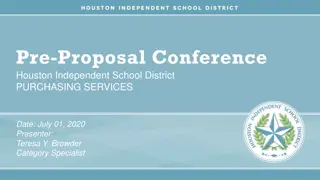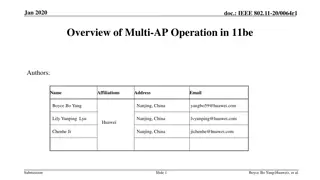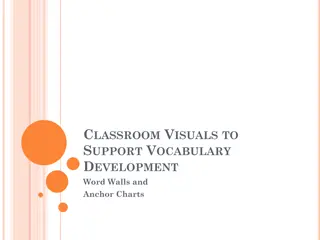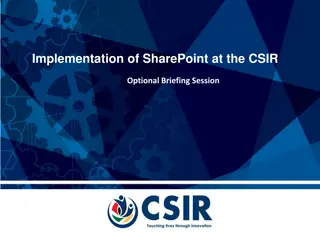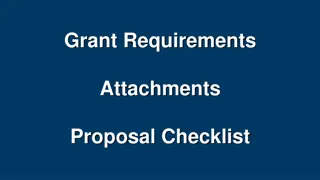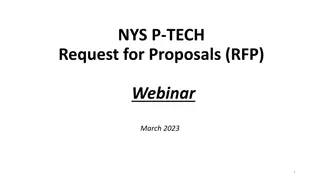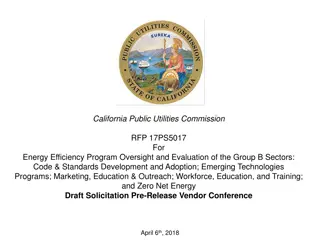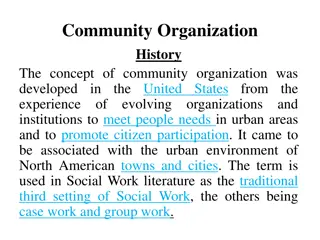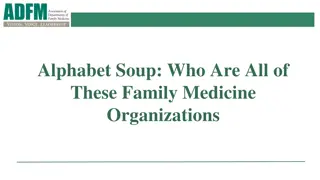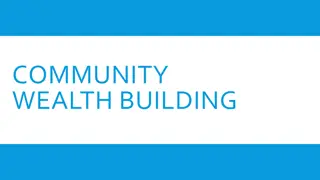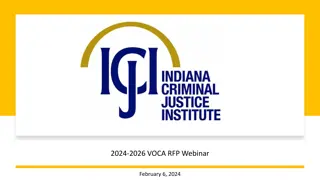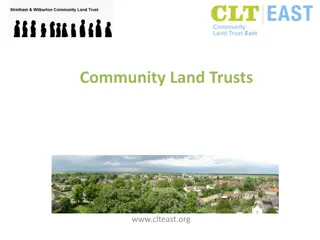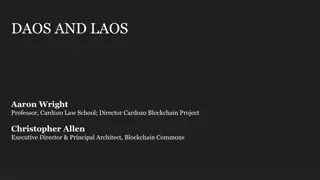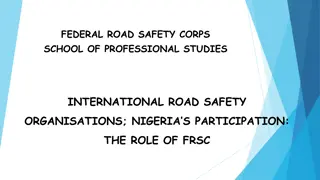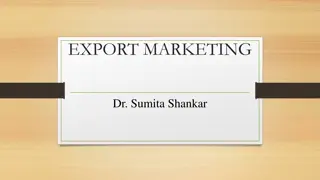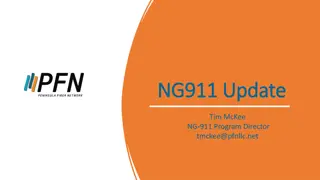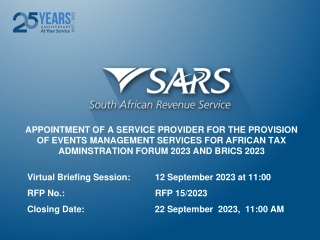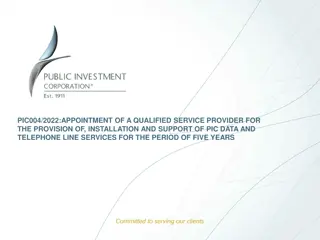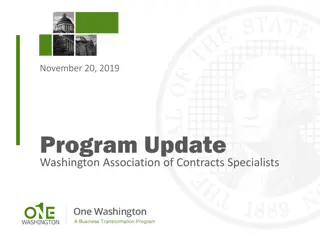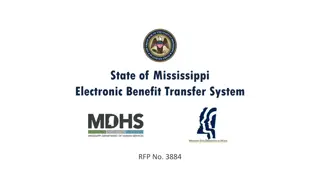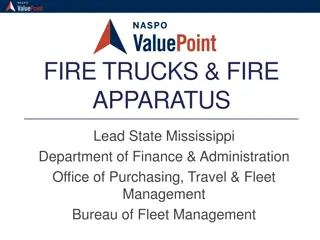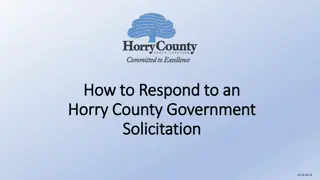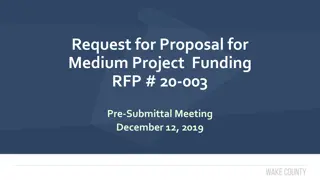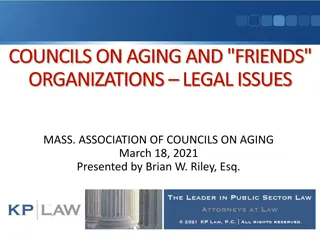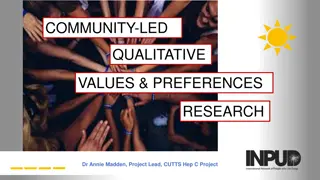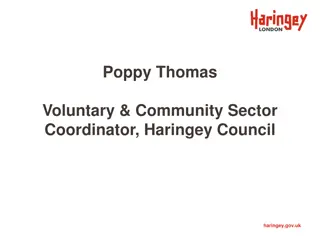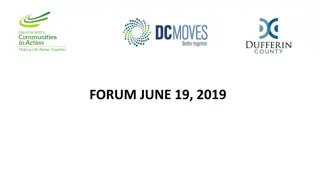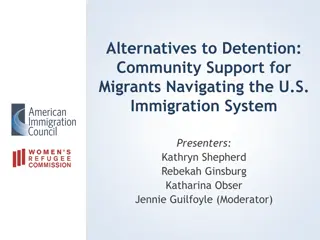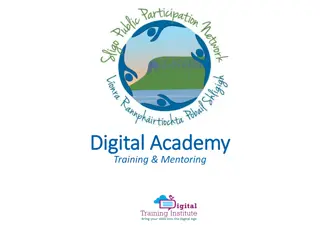DFSS MCMF Community Anchor Organizations RFP Details
The Department of Family and Support Services (DFSS) is releasing a Request for Proposal (RFP) for Community Anchor Organizations to deliver the My CHI My Future initiative across 15 regions in Chicago, focusing on addressing the COVID-19 pandemic-related impacts on young people and communities. The program aims to engage stakeholders and caring adults to provide meaningful out-of-school time programming for youth. This comprehensive summary covers the purpose, program scope, requirements, selection criteria, timeline, technical assistance, and more details related to the RFP. Interested community-based organizations with experience in youth development are encouraged to participate.
Download Presentation

Please find below an Image/Link to download the presentation.
The content on the website is provided AS IS for your information and personal use only. It may not be sold, licensed, or shared on other websites without obtaining consent from the author. Download presentation by click this link. If you encounter any issues during the download, it is possible that the publisher has removed the file from their server.
E N D
Presentation Transcript
Please stand by, the webinar will begin shortly. Department of Family and Support Services MCMF Community Anchor Organizations RFP Release Date: December 28, 2022 Due Date: February 3, 2023 MCMF Community Anchor Organizations
House Keeping Due to the volume of participants, everyone has been placed on mute. Please submit questions via the question box and we will respond to questions at the midpoint and end of the presentation. Please use the question box to notify us of any technical issues. This webinar is being recorded. A copy of the recording will be posted on the DFSS YouTube channel with a link to the recording and a .pdf of these Power Point slides will be posted to the DFSS webpage at: https://www.chicago.gov/city/en/depts/fss.html under the Alerts and/or Funding Opportunities tabs. This will take up to five business days. MCMF Community Anchor Organizations Page 2
Agenda Welcome and Introductions Purpose Background Program Scope and Requirements Selection Criteria Timeline Technical Assistance for Applicants and eProcurement Questions MCMF Community Anchor Organizations Page 3
Purpose of the RFP The Department of Family and Support Services (DFSS) seeks to fund community-based organizations to deliver the My CHI. My Future. (MCMF) Community Anchor Organization initiative in 15 regions across the city to address the COVID-19 pandemic-related effects on young people and communities. DFSS seeks to fund community-based organizations with experience in community-level convening, strategic planning, and youth development. MCMF Community Anchor Organizations Page 4
Program Description and Goals The goal of the MCMF Community Anchor Organization initiative is to address the COVID-19 pandemic-related effects on young people and communities through convening community-level stakeholders and caring adults committed to youth development (i.e., youth-serving organizations, faith leaders, school staff, etc.) to mobilize and connect young people of all ages to engaging and meaningful out-of-school time programming in their community. This work will include hosting monthly convenings of partners to strategize, collaborate, and share resources; creating and implementing a community plan outlining how agencies in the region, including the Anchor Organization, will support a healthy community ecosystem for youth; and hosting community engagement events (i.e., opportunity fairs, trainings). MCMF Community Anchor Organizations Page 5
Background MCMF was conceptualized in 2019 and has since launched several initiatives, including both city-wide and community-based strategies, to achieve the MCMF vision statement: Every young person in Chicago connects to a variety of rich, engaging, safe, and youth-centered out-of-school time experiences that empower them to discover and cultivate their talents, passions, skills, and identities; develop as physically, mentally, and emotionally healthy members of society; build relationships and networks with peers and mentors; and explore multiple pathways to college, careers, trades, entrepreneurship, and life-long learning. Access and participation in Chicago s diverse out-of-school opportunity ecosystem must be equitable (not equal) across race, gender identities, disability, age, immigration status, income, neighborhood, and other identities, resulting in all young people (as well as their families, mentors, and caring adults) leveraging community assets and the city s resources to build positive futures for themselves and their communities. MCMF Community Anchor Organizations Page 6
Background City-wide Strategy MCMF was initiated in the fall of 2019 through a citywide convening. In 2020, MCMF launched MyCHIMyFuture.org, an online database of youth programs across the city. In May 2022, MCMF launched a mobile app that works in conjunction with the online platform to ensure youth and families have opportunities to learn about and connect to programs and resources. MCMF Community Strategy In early 2020, the City selected four initial communities of focus (Austin, Back of the Yards, Garfield Park, and Roseland) for deeper connections and on-the- ground-work. In partnership with LISC Chicago, the City provided small seed grants in each of the focus communities to support existing and new youth programming. South Shore was added as a fifth focus community in 2021. Also in 2020, the City began implementing out-of-school time campaigns, such as Halloweek, Make 2021 Yours, and the Kickback series. During the summer and winter months, the City piloted the Kickback Series, which provided 278 youth with part-time jobs organizing 140 community events attended by more than 12,000 children and family members. In 2022, the summer Kickback Series employed youth in 15 regions across Chicago most impacted by COVID-19. MCMF Community Anchor Organizations Page 7
Background The MCMF Community Anchor Organizations Request for Proposals is the second in a series of RFPs to be released by DFSS in 2022-23 to implement the MCMF Community Strategy. The goal of these three RFPs together is to strengthen youth ecosystems and deepen networks for agencies in 15 Community Strategy Regions across Chicago through a variety of approaches. DFSS My CHI. My Future. RFPs The Year-Round Safe Spaces for Youth Initiative (RFP released Fall 2022) will provide year-round programming for youth and families and youth employment opportunities for youth ages 16-24 in 15 regions. The Micro-Grant Program (RFP release early 2023) will provide funding for safe and engaging youth programs within the 15 regions. The Community Anchor Organization Initiative (focus of this RFP) will provide support for anchor organizations to convene community-based organizations in 15 regions with the goal of strengthening local, youth- serving opportunity ecosystems. MCMF Community Anchor Organizations Page 8
RFP PAGE 8-9 Community Anchor Organizations RFP With this RFP, DFSS seeks to expand the MCMF community strategy through selecting an agency in each of 15 Community Strategy Regions to convene local youth-serving agencies and individuals towards the goal of developing a community plan focused on youth engagement opportunities. DFSS is committed to building upon best practices in youth development in the execution of all its programs. The priorities for improvement that DFSS is focusing on for this RFP include: Strengthen community-based approaches to address COVID-19 pandemic impact on youth Strengthen collaborative community partnerships Foster positive youth development through accessible and equitable approaches Strengths-based approach to working with youth and centering youth voice Prioritize continuous improvement, focusing on using data to make decisions MCMF Community Anchor Organizations Page 9
RFP PAGE 9-10 MCMF Community Strategy Regions MCMF Community Strategy Regions The MCMF Community Anchor Organizations program is designed to serve 15 MCMF Community Strategy Regions covering 19 Community Areas. Several of the Community Strategy Regions are made up of more than one community area. These 19 community areas, as seen in Table 1 on the following slide, ranked high on the Chicago Community Vulnerability Index (CCVI) and/or the UIC Chicago Community Area Economic Hardship Index. Additionally, 13 of the 15 MCMF Community Strategy Regions are foci for Mayoral initiatives, such as the Community Safety Coordination Center (CSCC) and/or Invest SOUTH/WEST. Delegates must be based in one of the 19 Community Areas; programming must engage young people and communities in the Community Area(s) within the agency s home Community Strategy Region. MCMF Community Anchor Organizations Page 10
RFP PAGE 9 MCMF Community Strategy Regions Table 1: MCMF Community Strategy Regions and Community Areas included within regions. MCMF Community Strategy Regions City of Chicago Community Areas Served Auburn Gresham Auburn Gresham Austin Austin Back of the Yards New City Belmont Cragin Belmont Cragin Brighton Park Brighton Park Chicago Lawn Chicago Lawn Gage Park Gage Park Garfield Park East Garfield Park West Garfield Park Greater Englewood Area Englewood West Englewood Greater Grand Crossing Greater Grand Crossing Greater Roseland Area Pullman Roseland Area West Pullman Humboldt Park Humboldt Park Little Village South Lawndale North Lawndale North Lawndale South Shore South Shore MCMF Community Anchor Organizations Page 11
RFP PAGES 9-10 Eligibility & Target Population The focus of this RFP is on agencies that serve 15 MCMF Community Strategy Regions covering 19 Community Areas. The Respondent is encouraged to recruit youth for opportunities and events related to the program from the following underrepresented populations outlined below: Individuals with disabilities (i.e., physically impaired, visually impaired) Individuals attending high schools that are categorized as Level 2, Level 3 or Options High School based on the current Chicago Public School Quality Rating Policy (SQRP) Individuals who are English as a Second Language learners Individuals that are experiencing homelessness/unstably housed Individuals placed in the foster care system Individuals who are justice involved (i.e., parole, probation) Opportunity youth defined as out of school and out of work MCMF Community Anchor Organizations Page 12
PROGRAM REQUIREMENTS RFP PAGES 10-17 Program Requirements Through the programs outlined in this RFP, anchor organizations will support the three pillars of the MCMF community strategy outlined below: Activate and convene a network of caring adults Strengthen the opportunity ecosystem for Chicago s youth Connect youth to opportunities centering their voice & choice MCMF Community Anchor Organizations Page 13
PROGRAM REQUIREMENTS RFP PAGES 10-17 Program Requirements The Program Requirements for this RFP are listed below: Host monthly convenings Create a Community Plan Develop and host community engagement events Hire (or assign) and manage quality Program Manager Ensure that agency, collaborating organizations, and youth are connected to the MCMF platform and app MCMF Community Anchor Organizations Page 14
HOST MONTHLY CONVENINGS RFP PAGES 11-12 Program Requirements Host monthly convenings Delegates will be required to host monthly convenings of stakeholders dedicated to youth development within their home Community Strategy Region. Anchor organizations will be required to build relationships and collaborate to achieve shared goals. DFSS will support this through providing connections to and collaborations with City departments and sister agencies, such as local libraries, parks, and schools. A key function of these convenings is to ensure that adults working in community youth spaces are connected to one another to ensure youth receive "warm handoffs" from one opportunity to the next. The connections established through monthly convenings will foster the creation of a strong youth ecosystem of support and learning opportunities. MCMF Community Anchor Organizations Page 15
HOST MONTHLY CONVENINGS RFP PAGES 11-12 Program Requirements Key functions of hosting monthly convenings: Host convenings Secure meeting location and manage logistics including tech, etc. Create and provide necessary materials, including food Create opportunities for meeting attendees to collaboratively develop detailed agendas with clear goals for each monthly convening Keep time during meetings and ensure that agenda items are addressed Manage any action items between monthly meetings, including items towards creation of Community Plan Keep detailed notes of each meeting including action items Oversee outreach and attendance Conduct outreach and build relationships with a diverse group of local stakeholders Ensure that convenings include representation from a range of groups, including but not limited to youth, faith-based organizations, social influencers, youth serving organizations, block club leaders, CPS administration, MCMF Safe Spaces for Youth agencies, and City agencies Send meeting invitations and follow up about attendance Ensure stakeholders are consistently present at convenings Submit monthly attendance reports to DFSS MCMF Community Anchor Organizations Page 16
HOST MONTHLY CONVENINGS RFP PAGES 11-12 Program Requirements Key functions of hosting monthly convenings (continued): Gather and report feedback and data Work with convening attendees to identify key findings (e.g., numbers and demographics for youth who are not connected to programming, existing programs in Community Strategy Region, etc.) to guide development of a Community Plan Track topics identified in meetings and meeting notes Trainings and support Use convenings to share resources and best practices with attendees based on stated needs of partners Bring in speakers and citywide agencies to conduct trainings and informational sessions with convening attendees Include time in meetings for attendees to share challenges and strategies with one another MCMF Community Anchor Organizations Page 17
CREATE A COMMUNITY PLAN RFP PAGES 12-14 Program Requirements Create a Community Plan Anchor organizations, in collaboration with community stakeholders, will develop a Community Plan that outlines a strategy to connect youth to programming in the Community Strategy Region. The community plan will enhance actions at the community level to close long-standing gaps in participation in educational opportunities with youth becoming more well-rounded and more well-prepared. This plan should address the impact of COVID-19 pandemic on youth in the community and detail the specific needs, barriers, and assets of the community. The Community Plan will be developed in stages (Table 2) and will be implemented and updated throughout the duration of the program s contract. The final Community Plan is the outcome of the monthly convenings and should include data and resources, as well as specific goals and an actionable plan for achieving those goals, identified during these convenings. Anchor organizations and community stakeholders will be expected to diagnose and address barriers that prevent youth from accessing out-of-school time programming through the development and implementation of the Community Plan, including conducting a community needs assessment. The community needs assessment process will provide the Anchor Organization and its collaborators with an overview of the strengths and resources available in the community to meet the needs of children, youth, and families, as well as any gaps. Through this process, the Anchor Organization and its partners will seek to understand what barriers the region faces and what opportunities may be available. Through the Community Plan, anchor organizations will help guide this critical analysis and cross- community collaboration to strengthen the youth ecosystem in their regions. MCMF Community Anchor Organizations Page 18
CREATE A COMMUNITY PLAN RFP PAGES 12-14 Program Requirements Create a Community Plan (continued): Table 2: Community Plan Timeline Goal Duration Schedule Convene stakeholders, identify shared goals and working groups 6 weeks April 1 May 15, 2023 Conduct community needs assessment 6 weeks May 15 June 30, 2023 Draft Community Plan, distribute for feedback and update 3 months July 1 September 30, 2023 Implement Community Plan v1 6 months October 1, 2023 March 31, 2024 Draft a sustainability plan after conclusion of the program s contract 2 months March 31 May 31, 2024 Evaluate process towards goals and update Community Plan as needed 2 months April 1 May 31, 2024 Implement Community Plan v2 6 months June 1 November 30, 2024 Evaluate Community Plan 2 months November 1 December 31, 2024 Update sustainability plan 1 month December 1 December 31, 2024 MCMF Community Anchor Organizations Page 19
CREATE A COMMUNITY PLAN RFP PAGES 12-14 Program Requirements Key functions of creating a community plan: Organize and oversee working groups Through monthly convenings, identify organizations to be part of working groups for development of a Community Plan Identify youth to be part of a youth working group Host two working group meetings per month (host additional working groups as needed to meet scheduling needs of organizations and youth participants) Establish check-ins to ensure that outcomes of working groups are tracked and reflected in the Community Plan Coordinate compensation for organizations and youth that are part of Community Plan working groups Conduct community needs assessment Identify and utilize existing resources for gathering data, or create new ones Leverage the existing MCMF app and website to identify programming in the region Work with the City and DFSS to pull data about region from existing databases Complete and implement the Community Plan within the program s duration according to the provided timeline (Table 2) MCMF Community Anchor Organizations Page 20
CREATE A COMMUNITY PLAN RFP PAGES 12-14 Program Requirements Key functions of creating a community plan (continued): Draft Community Plan including the following components Community background and goals Youth opportunities data & community needs assessment Plan to build, expand, and/or maintain a regional network Stakeholder roles and responsibilities Commitment to My CHI. My Future. Plan to coordinate outreach, education, and engagement strategies to link youth to opportunities in the community. Implement the Community Plan Publish the Community Plan to the MCMF community page and share with community stakeholders. Ensure that community stakeholders are equipped to carry out the goals of the community plan. Monitor progress to ensure goals are met. Track goals met. MCMF Community Anchor Organizations Page 21
CREATE A COMMUNITY PLAN RFP PAGES 12-14 Program Requirements Key functions of creating a community plan (continued): Evaluate the Community Plan Gather feedback from community stakeholders on the implementation of the Community Plan Conduct surveys within the community to assess the effectiveness of the plan in addressing needs gap Update as needed Draft a sustainability scope for the Community Plan to be implemented after the conclusion of initial contract Identify elements of the Community Plan that can be sustained without access to program funding Identify continued sources of funding or support for implementation and updating of the Community Plan Sustainability scope should be added as an addendum to the Community Plan upon completion MCMF Community Anchor Organizations Page 22
COMMUNITY ENGAGEMENT EVENTS Program Requirements RFP PAGE 15 Develop and host community engagement events Delegate agencies will be expected to develop and host community programming aligned with the development and implementation of the Community Plan. Three programs will be hosted in the region each year (Table 3) and may take the following forms, including but not limited to: Out-of-school program opportunity fairs for youth featuring local stakeholders Job recruitment events for youth ages 16-24 Job readiness trainings for youth and families Youth outreach training for youth-serving local stakeholders Trainings for community-based, youth-serving organizations Events designed to share out the findings and implementation of the Community Plan Table 3: Overview of Community Engagement Events Season Alignment Number of Required Events Spring (March/April) CPS Spring Break 1 event Summer (May/June) CPS Summer Break 1 event Fall (August/September) Start of the CPS School Year 1 event MCMF Community Anchor Organizations Page 23
COMMUNITY ENGAGEMENT EVENTS Program Requirements RFP PAGE 15 Key functions of developing and hosting community engagement events: Develop programming that is responsive to gaps identified in the Community Plan Oversee event logistics including securing space, renting or providing supplies and materials, paying vendors, etc. Manage outreach to youth and families including flyers, social media, and email blasts Manage outreach and communications to participating stakeholders Host planning meetings with participating stakeholders as needed Provide follow up communication and/or materials for programming as needed MCMF Community Anchor Organizations Page 24
HIRE AND MANAGE PROGRAM MANAGER Program Requirements RFP PAGES 15-16 Hire/assign and manage quality Program Manager Organizations must recruit, hire, and manage a Program Manager (new position or repurposed current position) to supervise the activities outlined in this RFP: host monthly convenings, create a community plan, and develop and host community engagement events. Duties also include administrative functions such as collecting and entering data and representing the community region at citywide events. Program Managers should be positive, enthusiastic, civic minded individuals with connections to both their community and the world outside their community. Program Managers should have experience and skills in community organizing, project management, leadership, recruiting and mobilizing, or related areas. MCMF Community Anchor Organizations Page 25
HIRE AND MANAGE PROGRAM MANAGER Program Requirements RFP PAGES 15-16 Key functions of hiring/assigning and managing quality Program Manager: Hire (or repurpose current position) and supervise Program Manager to oversee the program from kick-off to completion Administer payroll for Program Manager. Personnel salaries and/or payment will not exceed the budget allocation unless supplemented with administrative funds or in- kind match All program staff working with youth must be properly trained and have cleared a background check on file with their agency and DFSS prior to the start of programming. All documentation must be current and entered in the database system for verification prior to the program start date. Staff/volunteers cannot work with youth until background checks are completed. Staff and volunteers can only work with youth in the presence of a staff person who has a cleared Federal Fingerprint Background check. Prior to the program start date, staff must have: Federal Fingerprint Background check (required every five years from date of initial check) Illinois Mandated Reporter Training, Certificate, & Acknowledgment of Mandated Reporter Status Form (annual) Cardiopulmonary resuscitation (CPR) and First Aid Certification (every two years) MCMF Community Anchor Organizations Page 26
HIRE AND MANAGE PROGRAM MANAGER Program Requirements RFP PAGES 15-16 Program Manager roles and responsibilities: Work with agency Leadership and administrative team to oversee the successful roll-out and implementation of the Anchor Organizations initiative. Duties related to hosting monthly convenings and working group meetings including creating agendas, facilitating/co-facilitating meetings, overseeing outreach, securing location, sending invites, managing logistics, and creating and providing necessary materials. Duties related to hosting Community Engagement Events including overseeing outreach to stakeholders, youth, and community members; working with leadership to plan and execute engaging events; securing location; working with vendors; and acting as day-of contact for events. Ensure elements of the Community Plan are developed according to the provided timeline (Table 2). Play a role in the development of the Community Plan, including writing and/or working with consultants to oversee creation of the Community Plan. Oversee implementation of Community Plan and support stakeholders as needed. Manage MCMF community page for region and MCMF page for anchor organization; ensure that youth opportunities, events, resources, and more are updated as needed. Share program data as requested by DFSS. Represent the region in MCMF and sister-agency city-wide events and initiatives. Act at liaison between DFSS, Mayor s Office and the anchor organization and region. MCMF Community Anchor Organizations Page 27
CONNECT TO MCMF PLATFORM AND APP Program Requirements RFP PAGES 16-17 Ensure that agency, collaborating organizations, and youth are connected to the MCMF platform and app Agencies funded to carry out the programs outlined in this RFP will be connected to the MCMF collaborative youth opportunity ecosystem in Chicago. As part of this agreement, agencies must incorporate MCMF into their work in the following ways. Trainings and resources required to carry out these requirements will be provided as needed. MCMF Community Anchor Organizations Page 28
CONNECT TO MCMF PLATFORM AND APP Program Requirements RFP PAGES 16-17 Key functions of ensuring that agency, collaborating organizations, and youth are connected to the MCMF platform and app: Manage Community Page for MCMF Community Strategy Region on MCMF website. Community Page will include program information, contact information, resources, as well as information about monthly convenings and the Community Plan. Create a MCMF account for the organization to post opportunities on the website and app. Resources and guides can be found at partners.mychimyfuture.org. Post all youth-related opportunities (events, jobs, programs, resources) for youth ages 0-24 offered by the agency to the MCMF platform on the first day of each month. Encourage all collaborating organizations to post all youth-related opportunities (events, jobs, programs, resources) for youth ages 0-24 offered by the agency to the MCMF platform on the first day of each month. Encourage all youth participants in related programs ages 13 and older who have smartphones (Android and iPhone) to download the MCMF app to get access to opportunities throughout the year. Delegates must participate in citywide and local MCMF convenings and networks. Information on these meetings will be posted in MCMF s weekly newsletters. Delegates can sign up for this newsletter at partners.mychimyfuture.org. MCMF Community Anchor Organizations Page 29
RFP PAGES 17-18 Budget Breakdown Table 4: MCMF Anchor Organization Initiative Sample Budget Breakdown Per Delegate: Year 1 Personnel (includes salary + fringe benefits) -- -- Total Funding Project Manager (FT salary) -- -- $55,500 Agency Director (25% of FT salary) -- -- $38,850 Agency coordinator/admin (55% of FT salary) -- -- $27,750 Community Convenings Cost (per event) Number of events Total funding Space Rental $250 10 $2,500 Materials and supplies $100 10 $1,000 Speaker honoraria $150 10 $1,500 Community Plan (Year 1)* -- -- Total funding Consulting fees (design, writing, copywriting) -- -- $7,500 Consulting fees (research, needs assessment) -- -- $15,000 Research / data miscellaneous (incentives, materials and supplies) -- -- $2,500 Outreach materials -- -- $2,000 Community Plan Working Groups Cost (per event) Number of events Total funding Materials and supplies $100 20 $2,000 Community organization honoraria (15 agencies * $100 per meeting) $1,500 20 $30,000 Youth honoraria (10 individuals * $100 per meeting) $1,000 20 $20,000 MCMF Community Anchor Organizations Page 30
RFP PAGES 17-18 Budget Breakdown (continued) Table 4: MCMF Anchor Organization Initiative Sample Budget Breakdown Per Delegate: Year 1 (continued) Community Engagement Events Cost (per event) Number of events Total funding Materials and supplies $200 3 $600 Speaker honoraria / performer fees $500 3 $1,500 Space / equipment rental $750 3 $2,250 Transportation $200 3 $600 Food Related Costs for Participants -- -- Total funding Food related costs for participants at events and meetings -- -- $6,600 Subtotal $217,650 Agency Administrative Costs (15% of total budget) $32,648 TOTAL RFP funding per delegate per contract period $250,298 *During the first year of funding, Community Plan expenses should be used for research and development; during the second year of funding, Community Plan expenses should be used for evaluation and sustainability planning. MCMF Community Anchor Organizations Page 31
RFP PAGE 22 Advanced Payment Policy The Respondent is required to incur and pay expenses before seeking reimbursement from the City. However, advances for costs will be considered according to the City s advance payment policy. Respondents will need to indicate in their application whether they wish to exercise the City s advance payment policy option. For additional information about the City's advance payment policy, see the Delegate Agency Request for Advance Mobilization Payment Form which has been uploaded as an attachment in the RFP s application. This form is attached to the RFP for information only, and applicants should not complete the form at the time of submitting the application. MCMF Community Anchor Organizations Page 32
RFP PAGES 18-20 Performance Goals and Outcomes The goal of this program is to mobilize strategies to connect young people of all ages to engaging and meaningful out-of-school time programming in each of the 15 MCMF Community Strategy Regions, 19 addressing the impact of COVID-19 on under-resourced communities through coordinated community-based approaches. To track progress toward achieving the outcome goals of this program and assess success, DFSS will monitor a set of performance indicators. We will monitor the outcomes below through data collection from community stakeholders and youth and families. Monitored performance indicators may include, but are not limited to: Community Convenings Outputs Agencies host 10 Community Convenings each year 20 non-city stakeholders attend at each monthly meeting At least 3 sectors (i.e., youth programming, faith, education, public health) are in attendance at each meeting Participating stakeholders attend at least 75% of meetings per year 75% of participating stakeholders contributing to shared calendar Outcomes 100% of stakeholders, including anchor organization, collaborating organizations, youth, and community members, will feel that the Community Convenings contributed to a stronger community youth ecosystem MCMF Community Anchor Organizations Page 33
RFP PAGES 18-20 Performance Goals and Outcomes Community Plan Outputs At least 15 non-city stakeholders attend 95% of working group meetings At least 10 youth attend 95% of Community Plan working group meetings 100% of Community Plan completion deadlines are met 75% of activities outlined in the Community Plan are completed 25% of youth disconnected from out-of-school programs are connected to opportunities after implementation of the Community Plan Outcomes 100% of stakeholders, including anchor organization, collaborating organizations, youth, and community members, will feel that the Community Plan contributed to a stronger community youth ecosystem Community Engagement Events Outputs Agencies will host 3 events each year 100 households/individuals are reached at each event Outcomes 85% of attendees will report feeling a sense of community or belonging at events 85% of attendees will report feeling like the content of events reflects their interests or needs MCMF Community Anchor Organizations Page 34
RFP PAGES 18-20 Performance Goals and Outcomes MCMF Platform Outputs 25% increase in number of programs and activities posted on the MCMF app and website after one year. Outcomes 75% of caring adults at anchor organizations and other community stakeholders will believe that the MCMF network has helped them to identify opportunities for the youth with which they interact. MCMF Community Anchor Organizations Page 35
RFP PAGE 21 Guidance for Respondents Respondents must indicate which MCMF Community Strategy Region they will be applying for: Auburn Gresham, Austin, Back of the Yards, Belmont Cragin, Brighton Park, Chicago Lawn, Gage Park, Garfield Park, Greater Englewood Area, Greater Grand Crossing, Greater Roseland Area, Humboldt Park, Little Village, North Lawndale, South Shore Respondents must submit one application for each MCMF Community Strategy Region for which they wish to apply. Respondents can only apply for a MCMF Community Strategy Region in which they can demonstrate a physical address. Multiple applications by the same agency for the same MCMF Community Strategy Region will NOT be considered MCMF Community Anchor Organizations Page 36
RFP PAGE 21 Guidance for Respondents To determine the Chicago community area where your program is located, go here: https://data.cityofchicago.org/Facilities-Geographic- Boundaries/Boundaries-Community-Areas-current-/cauq-8yn6 Click the symbol circled below to enter an address and determine the Chicago community area where it is located. MCMF Community Anchor Organizations Page 37
RFP PAGES 23-24 Selection Criteria Community Involvement The Respondent understands the distinct assets and challenges faced by the region it serves The Respondent has expertise working with the target population and has relevant capabilities and/or infrastructure needed to serve this group The Respondent s organization reflects and engages the diverse people of the communities it serves MCMF Community Anchor Organizations Page 38
RFP PAGES 23-24 Selection Criteria - Organizational Capacity The Respondent has a plan to ensure a qualified staff person responsible for program oversight and management is hired or reassigned The Respondent has adequate systems and processes to support monitoring program expenditures and fiscal controls The Respondent has articulated a strategy to ensure adequate staffing to achieve the outcomes of the program MCMF Community Anchor Organizations Page 39
RFP PAGES 23-24 Selection Criteria Strength of Proposed Program The Respondent provides a clear connection between their mission and/or vision and the MCMF mission and vision The Respondent provides a clear connection between their proposed program activities and the outcome goals of the RFP The Respondent has a plan to recruit and retain collaborating agencies in the region The Respondent has experience partnering with other local organizations to better support the community it serves The Respondent demonstrates prior experience with planning, promoting, and executing events The respondent demonstrates an understanding of resources or processes available to use in determining assets and gaps in the region MCMF Community Anchor Organizations Page 40
RFP PAGES 23-24 Selection Criteria Performance Management and Outcomes The Respondent demonstrates evidence of strong past performance in similar programs against desired outcome goals and performance metrics The Respondent has experience using data to inform/improve its services or practices The Respondent has the relevant systems and processes needed to collect and store key participant and performance data The Respondent has the relevant systems and processes needed to track and report performance on program outcomes The Respondent has demonstrated experience with collecting and analyzing data to inform programming MCMF Community Anchor Organizations Page 41
RFP PAGES 23-24 Selection Criteria Reasonable costs, budget justification, and leverage of funds The Respondent describes the cash-flow and capacity to expend funds prior to implement the proposed program The Respondent demonstrates an understanding of how the allotted budget can be implemented to meet the proposed scope of work or work plan The Respondent describes an auditing process MCMF Community Anchor Organizations Page 42
Selection Criteria - Attachments Be sure to attach the job description for the Program Manager overseeing the program. Be sure to attach your organization's budget for this program Please ensure that all program requirements are addressed Please ensure that the request from DFSS does not exceed the total outlined in the sample budget provided in the RFP (Table 4, pages 17-18) MCMF Community Anchor Organizations Page 43
Selection and Transition Timeline Pre-proposal webinar January 11, 2023 Applications due February 3, 2023, at 12:00 noon Program period begins March 1, 2023 MCMF Community Anchor Organizations Page 44
Deadline Applications are due on February 3, 2023 at 12:00, Noon MCMF Community Anchor Organizations Page 45
Application Tips Start Early!! If you have never done business with the City of Chicago, register into iSupplier/eProcurement ASAP. Review RFP narratives and application questions closely. Remember they align with the scope and selection criteria. Use the information in the RFP for guidance in formulating your answers. There is a 4,000-character limit which includes punctuation and spaces. Each response is allotted 4,000 characters. Do not use the back button on your browser. Save Often!! MCMF Community Anchor Organizations
Tips for Working in eProcurement You can submit your application and later amend it up until the due date February 3, 2023, at 12:00 noon. Avoid the rush and possible mishaps by submitting early. Plan on submission taking 30-60 minutes. Late applications will not be accepted. Make use of the eProcurement hotline for help at 312-744- 4357 (HELP). Please note that the hotline operates during business hours only, Monday-Friday 9-5. Save often, submit early! MCMF Community Anchor Organizations
Technical Assistance! On the DFSS web page is a link to the RFP of interest and training documents. See Alerts Section on our website. For Questions on Registration and eProcurement Technical Assistance for Delegate Agencies CustomerSupport@cityofchicago.org or call 312-744-HELP (4357) Training Materials (Documents and Videos) https://www.cityofchicago.org/city/en/depts/dps/isupplier/online- training-materials.html MCMF Community Anchor Organizations Page 48
How to Accept an Amendment NAME OF RFP Page 49 MCMF Community Anchor Organizations
How to accept an amendment Step 1 If the RFP you are interested in has been amended. In order to start an application, you will need to acknowledge and accept the amendment first. (Please not that the RFP shown in this and subsequent slides is an example). To accept the amendment, click on View Amendment History . If the RFP has not been amended (yet), select Create Quote from the drop-down menu in the Actions box and click on Go . This will take you to the application page, where you can get started. NAME OF RFP Page 50 MCMF Community Anchor Organizations
